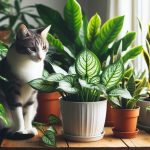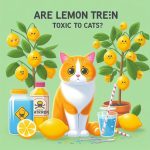Understanding the potential dangers of cloves for cats is essential for any feline owner. As a responsible pet parent, it’s crucial to be aware of the symptoms of clove toxicity and the necessary steps to take if ingestion occurs.
Exploring safe alternatives to cloves and preventive measures can help protect your cat from potential exposure.
Additionally, consulting a veterinarian and being informed about treatment options and the risks of essential oils containing cloves are vital in keeping your beloved feline friend safe. Let’s delve deeper into the topic: are cloves toxic to cats?
The Potential Dangers of Cloves for Cats – Are Cloves Toxic to Cats?
When it comes to the question “are cloves toxic to cats,” it’s essential to understand the potential risks associated with these common household items. Cloves, whether in their raw or essential oil form, can pose significant dangers to our feline friends. Here’s why:

Toxic Compounds: Cloves contain eugenol, a substance that is toxic to cats. When ingested in large enough quantities, eugenol can lead to severe health issues and poisoning in cats.
Gastrointestinal Distress: One of the primary dangers of cloves for cats is the potential to cause gastrointestinal distress. Ingesting cloves can lead to symptoms such as vomiting, diarrhea, and abdominal pain in cats.
Liver Damage: Clove toxicity in cats can also result in liver damage. This vital organ can be adversely affected when a cat ingests cloves, leading to potentially life-threatening complications.
Respiratory Issues: Inhalation of clove essential oil can also be harmful to cats. The potent aroma of the oil can cause respiratory issues and difficulty breathing in our feline companions.
It’s crucial for cat owners to be aware of these dangers and take necessary precautions to prevent their pets from being exposed to cloves. In the next sections, we will explore the symptoms of clove toxicity in cats and the steps to take if your cat ingests cloves, providing you with the knowledge to keep your cat safe and healthy.
Symptoms of Clove Toxicity in Cats
Clove toxicity in cats can lead to various symptoms that indicate potential poisoning. It’s essential to be aware of these signs and seek immediate veterinary care if you notice any of them. Here are the common symptoms of clove toxicity in cats:

Gastrointestinal Distress: Cats may experience vomiting, diarrhea, or excessive drooling after ingesting cloves or essential oils containing cloves. This can lead to dehydration and discomfort for the feline.
Respiratory Issues: Inhalation of clove oil or exposure to high concentrations of clove scent can cause breathing difficulties in cats. Labored breathing, coughing, or wheezing should not be ignored.
Oral and Throat Irritation: Cats may exhibit signs of oral and throat irritation such as pawing at the mouth, excessive licking of lips, or vocalizing due to discomfort.
Allergic Reactions: Some cats may have allergic reactions to cloves, leading to symptoms like swelling, itching, hives, or redness of the skin.
Lethargy and Weakness: Clove toxicity can also manifest as a lack of energy, weakness, or difficulty in moving for the affected cat.
Liver and Kidney Damage: In severe cases of clove poisoning, cats may experience liver or kidney damage, which can present as jaundice, increased thirst, or changes in urinary habits.
Are Cloves Toxic to Cats?
Recognizing these symptoms promptly is crucial for addressing clove toxicity in cats. If you observe any of these signs or suspect that your cat. Has come into contact with cloves, seek professional veterinary assistance without delay to ensure their well-being.
Steps to Take If Your Cat Ingests Cloves
If you suspect that your cat has ingested cloves, it’s crucial to take immediate action to minimize any potential harm. Here are the steps to take if your cat ingests cloves:

Contact Your Veterinarian: Reach out to your veterinarian or the nearest animal poison control center immediately. Provide them with details such as the type and quantity of cloves ingested, as well as your cat’s current symptoms.
Observe Your Cat’s Symptoms: Keep a close eye on your cat for any abnormal behavior or symptoms of clove toxicity, such as vomiting, diarrhea, difficulty breathing, or increased heart rate. Note down the time of ingestion and when symptoms started.
Refrain from Inducing Vomiting: Avoid attempting to induce vomiting in your cat without professional guidance, as it can potentially cause more harm.
Follow Veterinarian’s Instructions: Upon contacting the veterinarian, follow their instructions carefully. They might ask you to bring in your cat for examination and treatment.
Provide Supportive Care: While awaiting professional help, ensure that your cat is in a safe and comfortable environment. Keep them hydrated and offer reassurance to reduce stress.
Remember, prompt action is crucial when dealing with potential toxicity in cats. By seeking immediate veterinary assistance, you can ensure the best possible outcome for your feline companion.
By following these steps, you can effectively respond to incidents of clove ingestion and protect your cat from any adverse effects of this substance.
Always prioritize your cat’s well-being and consult a professional for the best course of action if you suspect clove ingestion.
Safe Alternatives to Cloves for Cats
When looking for safe alternatives to cloves for your feline friend, there are several options to consider. Here are some cat-friendly alternatives that you can use instead of cloves:
Catnip: This herb is a safe and non-toxic alternative that many cats enjoy. It can be used to add fragrance to certain items or areas in your home without posing any harm to your cat.
Silver Vine: Similar to catnip, silver vine is another safe alternative that can be used to entice your cat without the risk of toxicity.
Valerian: Valerian root can be an attractive alternative for cats. It is often used in cat toys and has a similar effect to catnip.
Honeysuckle: Some cats are attracted to honeysuckle wood. Which can be used in toys or scratching posts as a safe alternative to cloves.

It’s important to note that while these alternatives are considered safe for cats. It’s still essential to observe your cat’s reaction when introducing any new herb or plant. Always monitor your cat for any signs of adverse effects and consult with your veterinarian. if you have any concerns about the safety of specific alternatives.
By opting for these safe alternatives. You can provide your cat with enjoyable experiences without risking exposure to potentially harmful substances like cloves. Are Cloves Toxic to Cats?
Remember, the well-being of your furry companion should always be a top priority. and choosing safe alternatives is a proactive step in ensuring their health and safety.
In the next section, we will discuss preventive measures to protect your cat from clove exposure.
Preventive Measures to Protect Your Cat from Clove Exposure
When it comes to ensuring the safety of your feline friend. Taking preventive measures to protect them from clove exposure is crucial. Here are some steps you can take:

Secure Storage: Store cloves and products containing cloves in secure cabinets or areas that are inaccessible to your cat. This reduces the risk of accidental ingestion.
Use Caution with Essential Oils: If you use essential oils containing cloves. Always do so in a well-ventilated area and ensure that your cat does not come into direct contact with the oils. Consider using a diffuser that is placed in a location your cat cannot access.
Check Ingredients: Before using any household or personal care products, check the ingredients to ensure they do not contain cloves. This includes items such as toothpaste, soaps, and potpourri.
Educate Household Members: Make sure that everyone in your household, including visitors, is aware of the potential dangers of cloves for cats. Inform them about the importance of keeping these items out of reach of the feline members of the household.
Consult Your Veterinarian: If you have any concerns about the potential toxicity of a product or substance in your home, consult your veterinarian for guidance. They can provide specific advice tailored to your cat’s health and living environment.
By implementing these preventive measures, you can significantly reduce the risk of your cat being exposed to cloves and experiencing any related toxicity. Taking proactive steps to create a safe environment for your cat is an essential aspect of responsible pet ownership. Are Cloves Toxic to Cats?
Remember, being mindful of potential dangers such as cloves is a proactive way to keep your cat safe and healthy.
The Importance of Consulting a Veterinarian
When it comes to the health of our feline companions. Consulting a veterinarian is crucial, especially in cases of potential toxicity such as cloves. If you suspect that your cat has ingested cloves or is displaying symptoms of clove toxicity. Seeking professional medical advice is vital. Here’s why consulting a veterinarian is important:

Expert Assessment: Veterinarians are trained to assess the health of animals, diagnose potential toxicities, and recommend appropriate treatment. They can provide an accurate evaluation of your cat’s condition and offer specific guidance based on the level of clove exposure.
Tailored Treatment: Consulting a veterinarian ensures that your cat receives tailored treatment for clove poisoning. They can administer the necessary medical interventions, such as induced vomiting, activated charcoal administration, or intravenous fluids, based on the severity of the toxicity.
Prevention of Complications: Veterinarians can help prevent potential complications associated with clove toxicity. Their prompt intervention can minimize the impact of poisoning on your cat’s health and prevent the development of more serious complications.
Professional Advice: By consulting a veterinarian, you gain access to professional advice on managing and preventing clove exposure in the future. They can provide insights into safe alternatives, preventive measures, and potential risks associated with essential oils containing cloves.
In conclusion, consulting a veterinarian in cases of potential clove toxicity in cats is the best course of action to safeguard your pet’s well-being. Their expertise and guidance are invaluable in ensuring the speedy recovery and long-term health of your beloved feline companion.
Treatment Options for Clove Poisoning in Cats
If you suspect that your cat has ingested a toxic amount of cloves, it’s crucial to seek immediate veterinary care. Treatment options for clove poisoning in cats may include the following:

Inducing Vomiting: In some cases, the vet may induce vomiting to remove the cloves from the cat’s system.
Activated Charcoal: This method may be used to prevent further absorption of toxins in the cat’s digestive system.
Supportive Care: The veterinarian may provide supportive care to manage symptoms, such as intravenous fluids to maintain hydration and medications to alleviate gastrointestinal discomfort.
Monitoring: After initial treatment, the cat may need to be closely monitored to ensure that there are no further complications from clove toxicity.
Additionally, it’s important to be transparent with the veterinarian about the quantity of cloves the cat may have ingested, as well as any concurrent health issues.
Comparison Table: Natural Remedies and Traditional Treatments
For a quick comparison, here’s a table outlining the differences between natural remedies and traditional treatments in managing clove poisoning in cats:
| Aspect | Natural Remedies | Traditional Treatments |
|---|---|---|
| Inducing Vomiting | Limited effectiveness | Often performed by the veterinarian |
| Activated Charcoal | Minimal availability, questionable efficacy | Widely available, proven efficacy |
| Supportive Care | Limited options | Extensive options available |
| Monitoring | Basic monitoring techniques | Advanced medical monitoring |
Remember that the information provided here is for reference purposes only. and professional veterinary guidance is essential to address any case of clove poisoning in cats effectively.
Understanding the Risks of Essential Oils Containing Cloves
When it comes to essential oils containing cloves. it’s crucial for cat owners to be aware of the potential risks associated with these products. Essential oils are highly concentrated substances that can pose a significant threat to feline companions. Here’s what you need to know about the risks of essential oils containing cloves:
Toxicity Levels: Essential oils, including clove oil, can be toxic to cats, especially when ingested or applied directly to their skin. Cats lack certain enzymes in their liver, which are essential for metabolizing and eliminating certain compounds found in essential oils. As a result, these compounds can build up in their bodies, leading to toxicity.
Potential Health Issues: Ingestion or exposure to essential oils containing cloves can lead to a range of health issues in cats, such as gastrointestinal upset, difficulty breathing, liver damage, and central nervous system disturbances. These symptoms can vary in severity depending on the amount of exposure and the individual cat’s sensitivity.
Risk of Accidental Exposure: Cats can easily come into contact with essential oils containing cloves through direct application to their fur, diffusers, or spills. Even small amounts of these oils can have detrimental effects on their health.
It’s important to note that while essential oils can have benefits for humans. They can pose a serious danger to cats. As such, it’s crucial to exercise caution and seek advice from a veterinarian before using any products containing cloves or other essential oils around feline companions.
Educating Others about the Dangers of Cloves for Cats
When it comes to the health and safety of our feline friends. it’s essential to spread awareness about potential hazards like clove toxicity. Educating others about the dangers of cloves for cats can help prevent accidental exposure and poisoning incidents. Here are some key points to consider when sharing this vital information:

Informing Fellow Pet Owners: Discuss the risks of cloves and essential oils containing cloves with other cat owners. Emphasize the importance of reading product labels and being cautious with diffusers and topical applications.
Pet-Sitters and Caretakers: If you have a pet sitter or caretaker for your cat, make sure they are well-informed about the dangers of cloves. Provide them with guidance on avoiding the use of clove-related products in your absence.
Social Media and Online Communities: Utilize social media platforms and online pet communities to raise awareness about the potential hazards of cloves for cats. Share relevant articles, experiences, and resources to reach a broader audience.
Local Veterinarian Offices and Pet Stores: Consider distributing informational flyers or brochures about the dangers of cloves to cats at local veterinarian offices and pet stores. Collaboration with these establishments can help reach more pet owners.
By educating others about the risks associated with cloves and cats, we can collectively work towards creating a safer environment for our beloved pets. It’s crucial to encourage open conversations and proactive measures to minimize the likelihood of clove toxicity in feline companions.
Conclusion: Keeping Your Feline Friend Safe from Clove Toxicity
In conclusion, it’s vital to be vigilant about the potential risks of cloves to your feline friend. While cloves have numerous benefits for humans, they can pose serious health hazards to cats if ingested. It’s crucial to take proactive steps to ensure your cat’s safety and well-being.
Key Points to Keep in Mind:
Awareness is Key: Being aware of the potential dangers of cloves for cats is the first step in safeguarding your pet’s health. Whether in the form of whole cloves, essential oils, or other products, understanding the risks is essential.
Consult a Veterinarian: If you suspect that your cat has ingested cloves or is exhibiting symptoms of clove toxicity. Seek immediate veterinary care. Prompt action can make a significant difference in your cat’s prognosis.
Explore Safe Alternatives: Instead of using cloves or clove-containing products around your cat, consider safe alternatives. There are numerous cat-friendly options available that can fulfill similar purposes without posing any risks.
Educate Others: Spread awareness about the dangers of cloves for cats to fellow pet owners, friends, and family members. Educating others can help prevent accidental exposure and protect more feline companions.
By prioritizing your cat’s safety, being proactive in seeking veterinary care, and promoting awareness. You can effectively mitigate the risks associated with cloves and ensure a safe environment for your beloved feline friend. Remember, preventing exposure to potentially toxic substances is a crucial aspect of responsible pet ownership.
Frequently Asked Questions
What are cloves and why are they dangerous to cats?
Cloves are aromatic flower buds commonly used as a spice. They are dangerous to cats because they contain compounds that can be toxic to felines, such as eugenol.
What are the symptoms of clove poisoning in cats?
Symptoms of clove poisoning in cats may include vomiting, diarrhea, difficulty breathing, weakness, and changes in behavior. In severe cases, it can lead to liver damage and failure.
How much cloves can be toxic to cats?
Even a small amount of cloves can be toxic to cats. It’s best to keep all products containing cloves away from cats, including spices, essential oils, and other household items.
What should I do if I suspect my cat has ingested cloves?
If you suspect that your cat has ingested cloves or any product containing cloves, contact your veterinarian immediately. Do not attempt to induce vomiting or administer any home remedies without professional guidance.
Can cats have any exposure to cloves safely?
Given the potential toxicity of cloves to cats, it is best to avoid any exposure to cloves. Keep all products containing cloves out of reach and ensure that your cat does not come into contact with them.
| Clove Form | Scientific Name | Toxic Compounds | Toxicity Level | Symptoms of Poisoning |
|---|---|---|---|---|
| Ground Cloves | Syzygium aromaticum | Eugenol | Moderate | Oral irritation, vomiting, diarrhea, lethargy |
| Whole Cloves | Syzygium aromaticum | Eugenol | Moderate | Gastrointestinal upset, difficulty breathing, collapse |
| Clove Oil | Syzygium aromaticum | Eugenol | High | Liver damage, respiratory distress, lethargy |
| Clove Powder | Syzygium aromaticum | Eugenol | Moderate | Gastrointestinal distress, abdominal pain |
Pet-Friendly Flowers: Are Carnations Toxic to Cats?
Read More Now..






